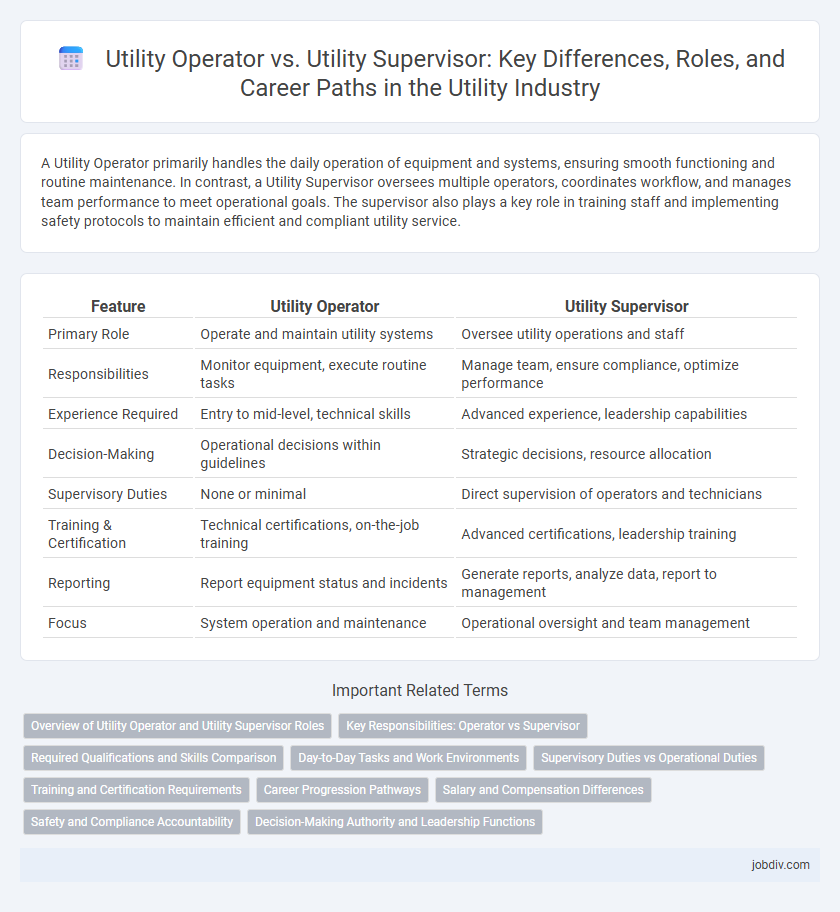A Utility Operator primarily handles the daily operation of equipment and systems, ensuring smooth functioning and routine maintenance. In contrast, a Utility Supervisor oversees multiple operators, coordinates workflow, and manages team performance to meet operational goals. The supervisor also plays a key role in training staff and implementing safety protocols to maintain efficient and compliant utility service.
Table of Comparison
| Feature | Utility Operator | Utility Supervisor |
|---|---|---|
| Primary Role | Operate and maintain utility systems | Oversee utility operations and staff |
| Responsibilities | Monitor equipment, execute routine tasks | Manage team, ensure compliance, optimize performance |
| Experience Required | Entry to mid-level, technical skills | Advanced experience, leadership capabilities |
| Decision-Making | Operational decisions within guidelines | Strategic decisions, resource allocation |
| Supervisory Duties | None or minimal | Direct supervision of operators and technicians |
| Training & Certification | Technical certifications, on-the-job training | Advanced certifications, leadership training |
| Reporting | Report equipment status and incidents | Generate reports, analyze data, report to management |
| Focus | System operation and maintenance | Operational oversight and team management |
Overview of Utility Operator and Utility Supervisor Roles
Utility Operators manage daily operations of equipment and systems such as boilers, pumps, and HVAC units to ensure efficient utility services in facilities. Utility Supervisors oversee multiple utility operators, coordinate maintenance schedules, enforce safety protocols, and handle troubleshooting and reporting to optimize utility system performance. Both roles are essential in maintaining continuous operation of water, steam, gas, and electric supply systems within industrial and commercial settings.
Key Responsibilities: Operator vs Supervisor
Utility Operators are responsible for the daily operation and maintenance of equipment, ensuring continuous utility service by monitoring systems, performing routine inspections, and addressing immediate technical issues. Utility Supervisors oversee operators, manage workflow, coordinate maintenance schedules, and ensure compliance with safety regulations and operational standards. Supervisors also handle staff training, report generation, and act as the primary liaison between operational teams and management.
Required Qualifications and Skills Comparison
Utility Operators require foundational skills in equipment operation, safety protocols, and basic troubleshooting, often supported by certifications like OSHA safety training and a high school diploma. Utility Supervisors demand advanced qualifications including extensive experience in utility systems management, strong leadership abilities, and proficiency in regulatory compliance, often necessitating a bachelor's degree in engineering or a related field. Both roles benefit from strong communication skills, but supervisors must excel in team coordination, project oversight, and strategic planning.
Day-to-Day Tasks and Work Environments
Utility Operators manage and maintain essential systems such as water, gas, or electricity, performing routine inspections, monitoring equipment, and addressing minor malfunctions to ensure continuous service. Utility Supervisors oversee operator teams, coordinate daily workflows, enforce safety protocols, and handle reporting and communication with higher management in industrial or municipal settings. Operators typically work hands-on in control rooms or field sites, while supervisors operate from both administrative offices and operational environments to facilitate efficient utility operations.
Supervisory Duties vs Operational Duties
Utility Supervisors primarily oversee and coordinate the work of utility operators, ensuring safety compliance and efficient workflow management. Utility Operators focus on executing tasks such as equipment operation, maintenance, and routine inspections under the supervisor's guidance. Supervisory duties involve planning schedules, training personnel, and monitoring performance metrics, while operational duties emphasize hands-on technical activities and fieldwork.
Training and Certification Requirements
Utility Operators typically require a high school diploma and on-the-job training, with certifications such as OSHA safety compliance and basic equipment operation. Utility Supervisors often need advanced certifications, including state-specific utility management credentials and leadership training programs, alongside extensive field experience. Both roles demand ongoing professional development to stay compliant with evolving industry standards and regulatory requirements.
Career Progression Pathways
Utility Operators typically start by managing equipment and systems on the ground, ensuring smooth daily operations in sectors like water, gas, or electricity. Progressing to a Utility Supervisor role involves overseeing teams, coordinating maintenance schedules, and implementing safety protocols, demonstrating leadership and advanced technical expertise. Career pathways often advance from operator to supervisor, then to managerial positions such as Utility Manager or Operations Manager, emphasizing skills in management, regulatory compliance, and strategic planning.
Salary and Compensation Differences
Utility operators typically earn a median salary range of $40,000 to $55,000 annually, reflecting their responsibilities in managing and maintaining utility equipment. Utility supervisors receive higher compensation, often between $55,000 and $75,000 per year, due to their leadership roles and oversight of operational teams. Salary differences stem from experience requirements, supervisory duties, and the level of technical expertise demanded by each position.
Safety and Compliance Accountability
Utility Operators are primarily responsible for executing daily operational tasks while adhering strictly to safety protocols and compliance standards set by regulatory agencies. Utility Supervisors oversee the entire utility team, ensuring all safety procedures are consistently followed and compliance requirements are met through regular training and audits. Accountability in safety and compliance is more pronounced in Utility Supervisors, who manage risk mitigation strategies and enforce corrective actions to maintain regulatory adherence.
Decision-Making Authority and Leadership Functions
Utility Operators are responsible for executing routine tasks and monitoring system performance, with limited decision-making authority typically confined to operational adjustments. Utility Supervisors hold higher decision-making authority, overseeing daily operations, managing personnel, and implementing strategic directives to ensure efficiency and safety. Leadership functions of Utility Supervisors include coordinating teams, resolving complex issues, and enforcing compliance with industry regulations.
Utility Operator vs Utility Supervisor Infographic

 jobdiv.com
jobdiv.com